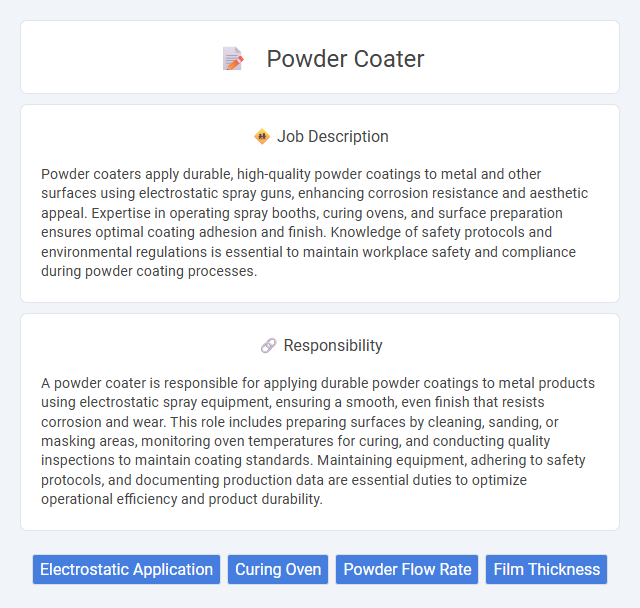
Powder coaters apply durable, high-quality powder coatings to metal and other surfaces using electrostatic spray guns, enhancing corrosion resistance and aesthetic appeal. Expertise in operating spray booths, curing ovens, and surface preparation ensures optimal coating adhesion and finish. Knowledge of safety protocols and environmental regulations is essential to maintain workplace safety and compliance during powder coating processes.
People with good physical stamina and attention to detail are likely suitable for a powder coater job, as it often requires standing for long periods and handling spray equipment accurately. Those who may have respiratory issues or sensitivity to chemicals might find this role challenging due to exposure to powder coatings and particles. Individuals comfortable with repetitive tasks in an industrial setting probably have a higher chance of thriving in this position.
Qualification
A powder coater must have a strong understanding of surface preparation techniques, including cleaning and sanding, to ensure proper adhesion of the powder coating. Proficiency in operating spray guns, curing ovens, and understanding different powder coating materials is essential for quality finishes. Technical skills, attention to detail, and knowledge of safety protocols in handling chemicals and equipment are critical qualifications for this role.
Responsibility
A powder coater is responsible for applying durable powder coatings to metal products using electrostatic spray equipment, ensuring a smooth, even finish that resists corrosion and wear. This role includes preparing surfaces by cleaning, sanding, or masking areas, monitoring oven temperatures for curing, and conducting quality inspections to maintain coating standards. Maintaining equipment, adhering to safety protocols, and documenting production data are essential duties to optimize operational efficiency and product durability.
Benefit
A powder coater job likely offers benefits such as improved durability and corrosion resistance for coated products, leading to longer lifespan and reduced maintenance costs. Workers may experience increased efficiency and environmental safety due to the use of non-toxic, eco-friendly powders instead of liquid paints. There is also a probability of enhanced job satisfaction stemming from producing high-quality finishes that meet industry standards.
Challenge
Working as a powder coater likely involves managing the challenge of applying durable, even coatings to various surfaces while ensuring environmental and safety regulations are met. There is a high probability that handling complex equipment and consistent color matching demands precision and skill under time constraints. The role probably requires adapting quickly to troubleshooting issues like coating defects or equipment malfunctions to maintain production quality.
Career Advancement
A powder coater can advance their career by gaining expertise in advanced coating techniques and quality control processes, which increases their value in manufacturing and industrial sectors. Opportunities for promotion often include supervisory roles such as lead operator or production manager, where leadership and process optimization skills are critical. Continuous training in new powder coating technologies and safety standards enhances career growth and opens pathways to specialized positions in automotive, aerospace, and construction industries.
Key Terms
Electrostatic Application
A powder coater specializing in electrostatic application uses a spray gun to electrically charge powder particles, ensuring they adhere uniformly to metal surfaces. This process enhances durability and corrosion resistance by creating a smooth, consistent coating layer without the use of solvents. Mastery of voltage settings and grounding techniques is essential for achieving optimal coating thickness and finish quality in industrial and automotive sectors.
Curing Oven
A powder coater expertly applies dry powder coatings to metal surfaces, ensuring a uniform finish before placing items into a curing oven. The curing oven operates at precise temperatures, typically between 160degC and 200degC, to melt and chemically bond the powder, resulting in a durable and smooth coating. Proper control of curing time and temperature is essential to achieve optimal adhesion and resistance against corrosion and wear.
Powder Flow Rate
Powder coaters must maintain precise control over powder flow rate to ensure consistent application thickness and high-quality finishes. Accurate powder flow rate adjustment optimizes material usage, minimizing waste and enhancing coating efficiency. Monitoring flow rate parameters is essential for preventing defects like orange peel or uneven coverage in industrial powder coating processes.
Film Thickness
Powder coaters specialize in applying durable powder coatings to surfaces, ensuring optimal film thickness for maximum protection and aesthetic appeal. Precise control of film thickness, typically ranging from 50 to 100 microns, prevents defects such as runs or insufficient coverage, enhancing corrosion resistance and durability. Advanced measurement tools like magnetic or ultrasonic gauges are essential for maintaining consistent film thickness standards in industrial applications.
 kuljobs.com
kuljobs.com